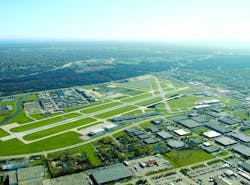Chicago - On a recent visit to the Chicago region, Airport Business sat with officials at Landmark Aviation (formerly DB Aviation) at the Waukegan Regional Airport, and airport managers at both the Chicago Executive and Dupage airports to get a sense of the challenges to operating in the current economic environment, and to see how business aviation is expected to fare here in the short term.
Waukegan Regional Airport (UGN), situated on 535 acres and located some 35 miles north of Chicago, is a general aviation facility with two runways and is categorized by FAA as a reliever for Chicago's O'Hare International Airport. DB Aviation, recently acquired by Landmark Aviation, is the sole FBO on the field offering aircraft charters and sales, maintenance, fuel, and FBO services.
Comments Landmark operations manager Joshua Lewis, "There hasn't been a significant pickup in activity over the last year; there was more traffic but less sales, and you seen a lot of home-based people buying buying product from home."
Chicago Executive Airport (PWK), formerly Palwaukee Municipal, is located 18 miles northwest of Chicago and is publicly owned by the City of Prospect Heights and the Village of Wheeling. Business here is coming back, says airport manager Dennis Rouleau, who has been on the field since 1989. "The economy put us down some 15 percent, but we still had people flying, and we didn’t lose anybody; our hangars were still full," he remarks.
Offering some 2,800 acres of property, 1,200 acres of which is solely dedicated to airfield activities, Dupage Airport (DPA) is located in the western Chicago region 29 miles from downtown Chicago. Owned and operated by the Dupage Airport Authority, manager David Bird says the airport is positioned well with a model of growth that is focused on the corporate sector.
"The entire industry has gotten smaller," comments Bird. "I think Chicago, as a center of commerce for the Midwest ... business is always going to be here; however, growth out of this economic climate is going to be modest."
Adjusting to the downturn
With the largest charter fleet in Chicago, according to Lewis, "The fourth quarter is typically a high quarter for charter, or aircraft activity here in general," he says. "As a general rule of thumb, the first two to three weeks of January tend to be down charter-wise; but we don’t see that this year, which is promising."
The facility has some 80 based aircraft, and the majority fuel sales comes from jet fuel (with the acquisition, the FBO is now an Eastern Aviation Fuels dealer).
"We haven’t had any new corporate flight departments come in since 2008," relates Lewis. "That’s more an indication of the industry as a whole and the economy, and not Chicago in and of itself.
"From an economic development standpoint , we rely a lot on the City of Waukegan and the Lake County Chamber of Commerce to really do their job in bringing in companies to the region."
At Chicago Executive, Rouleau says just looking at the month of December compared with last year, December’s traffic increased 42 percent; and year over year, traffic has gone up 8.6 percent.
With a number of charter companies on the field, he relates there was a bump in charter activity last year, however it leveled out. "Now things are starting to come back again," adds Rouleau. "Before the economic downturn, we went out for an RFP for an FBO on the Southeast corner of the field. We had four people respond to doing a business there. At the same time there was some interest in another parcel of land here … X Jet was looking at developing 13 acres."
In West Chicago, Dupage director David Bird says the impact of the downturn was dramatic here. "I think that some months we saw as much as 40 percent decreases," he explains. "Starting in the summer of ’08, we began to feel a significant impact. When we saw the financial collapse, and substantial number of flight departments liquidated and stopped flying.
"We reduced our budget significantly in response to that. We also reduced staffing significantly, especially at the manager and director level; that was our response.
Bird says the airport is starting to see some growth, and that the industry has hit bottom. "Business activity is clearly tracking with the recovery; we’re a lot more optimistic than we were a year ago at this time," he adds.
Development initiatives
Hangar space at Landmark is some 85 percent full, relates Lewis. DB Aviation completed a development of hangars two years ago, and the company has two more parcels of land at 90,000 square feet that can be developed.
Waukegan Airport has plans to extend its primary runway to 7,000 feet, plus an additional 1,000 per end for displaced threshold. "That really allows us to bring in larger aircraft that can tanker fuel and fly further," explains Lewis.
Rouleau says some 98 percent of hangar space at Chicago executive is occupied airport-wide. The airport recently completed a 48 unit six building T-hangar development (a Fulfab product) at a cost of some $2.6 million, and a new $5 million 24,500-square foot corporate hangar has also sprung up on the field; the privately-funded facility will house five jet aircraft.
Comments Rouleau, "Because of the economy, this was just a great time to build, and cost of materials are fairly cheap ... we had 15 contractors respond to bids for the T-hangar development, and we recently received bid openings for a self-fueling facility to support that hangar development.
"Development still going on in this economy; in fact, if you want to build, this is a great time to do it."
On the marketing front, Rouleau says that changing the airport's name in 2006 from Palwaukee Municipal to Chicago Executive has been a very positive thing.
Out at Dupage, the airport has recently completed the master plan. "We have a lot of green fields inside the fence," relates Bird. "We plan to continue to develop and grow our corporate hangar facilities; we are also reserving some land for possible large maintenance operators, in the event that we get those.
"We are surrounded by compatible development; it’s a pretty mature facility airside, and we are looking at growing the corporate sector over the next decade, which is the highest yield customer we have."
Dupage is also planning on extending one runway, giving the airport some operational flexibility so that when another runway is closed for maintenance, it'll be able to shift all of the traffic to the newly extended runway, says Bird. The project will be paid for with cash reserves.
On being an airport that is also the FBO and fuel provider on the field, Bird says it provides the ability to control the product more directly than if it were relying on a typical FBO.
Bird's concern for the near term is the possibility of another recession. "It’s going to take us years to get back to the prerecession levels of activity that we had in ’06," he explains. "The climb back is going to be slow."


